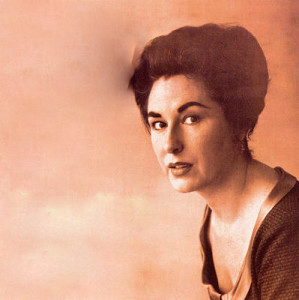Im Alter von 94 Jahren starb am 6. Juni 2016 die amerikanische Sopranistin Phyllis Curtin. In deutschprachigen Medien fand sich dazu kaum etwas, und es ist wahr: Sie war in Europa kein bekannter Name, denn sie blieb während ihrer langen und verdienstvollen Laufbahn weitgehend in den USA. Was nichts gegen ihre innige, intime und von Leuchten erfüllte Sopranstimme lyrischen Zuschnitts sagt. Kaum eine andere Stimme ihres Fachs hat mich derart berührt mit ihrer Intensität, ihrer Aussagekraft und ihrer Direktheit – vergleichbar vielleicht mit der von Benita Valente, Arleen Auger oder Suzanne Danco.

Phyllis Curtin /Copyright Creative Commons Attribution Non-Commercial, Share-alike University Musical Society
Mir begegnete diese bemerkenswerte Sopranstimme erstmals vor Jahren auf der Vanguard-Einspielung des Händelschen Samson mit Jan Peerce unter Maurice Abravanel. Ihre Delilah hier ist von kühler Eleganz, geradezu nonchalanter und infamer Sinnlichkeit, eben nicht offensichlich und vordergründig (etwa wie die Stimme der Moffo), sondern erst im cialis for sale online Nachhinein spürbar, eher intellektuell und ironisch. Eine zutiefst planende und ihre Mittel bewusst einsetzende schöne junge Frau.
Und manche Aufnahmen mehr kamen meines Wegs, alle nicht Mainstream, viel Modernes – eine Spezialität von Phyllis Curtin, die im zeitgenössischen Bereich vieles gesungen hat. Flloyds Susannah war eine ihrer Erkennungspartien und ihre Nähe zu den zeitgenössischen Komponisten ihrer Zeit prägte ihre Karriere.
Sie wurde am 3. Dezember 1921 im amerikanischen Clarksburg (WV) geboren und trat bereits 1946 am berühmten Tanglewood Music Center unter Leonard Bernstein und an der New England Opera Boston unter Boris Goldowsky auf. An der New York City Opera gab sie viagra online in south africa ihr Debüt 1953, wo sie sich durch das klassische und moderne Repertoire sang (viel Mozart, Strauss´ Salome 1954, Flloyds Susannah 1955 in der Weltpremiere ebendort). Die Susannah sang sie auch in Brüssel bei der Weltausstellung 1958. Weitere Uraufführungen von Flloyd folgten: so Wuthering Heights und The Passion of Jonathan Wade. Mehr als 50 eigens für sie geschriebene Werke brachte sie zur Erstaufführung, darunter Kompositionen von Milhaud (La Mère Coupable), Ginastera und Ned Rorem. 1961 kam es zum Eklat an der City Opera, als Beverly Sills ihr die Cleopatra in Händels Giulio Cesare wegnahm, mit der die Sills eine glanzvolle Karriere begann, während sich Curtin von diesem Schock nicht wirklich erholte. Sie kündigte und debütierte1961 zwar an der Metropolitan und sang auch in Lateinamerika, sogar an der Scala und der Wiener Staatsoper, aber irgendwie hatte sie danach das Label „zweite Wahl“, was sie doch kränkte.
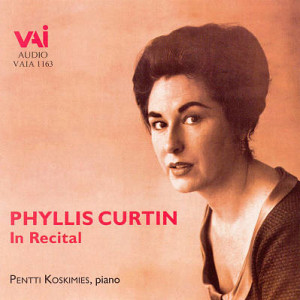 Sie zog sich auf die Moderne zurück, sang viel in Tanglewood und begann dort ab 1964 zu unterrichten. Diese Tätigkeit brachte ihr Professoren-Positionen in Branford, Boston und anderen Universitäten ein, und sie gab Meisterklassen bis hin nach Tblissi und Aldeburgh, wurde zum Dean an der Boston University ernannt und initiierte 1985 als Artistic Director das American Opera Institute. Sie sang für Präsident Ford beim berühmten White House Dinner zu Ehren von Helmut Schmidt, erhielt alle erdenklichen Auszechnungen diverser Institute und einen Ehrendoktor in Wellesley und fünf Ehrendoktortitel des New England Conservatory Boston, eine immense Ehre.
Sie zog sich auf die Moderne zurück, sang viel in Tanglewood und begann dort ab 1964 zu unterrichten. Diese Tätigkeit brachte ihr Professoren-Positionen in Branford, Boston und anderen Universitäten ein, und sie gab Meisterklassen bis hin nach Tblissi und Aldeburgh, wurde zum Dean an der Boston University ernannt und initiierte 1985 als Artistic Director das American Opera Institute. Sie sang für Präsident Ford beim berühmten White House Dinner zu Ehren von Helmut Schmidt, erhielt alle erdenklichen Auszechnungen diverser Institute und einen Ehrendoktor in Wellesley und fünf Ehrendoktortitel des New England Conservatory Boston, eine immense Ehre.
Phyllis Curtin wird in die Geschichte des Gesangs als ideale Interpretin der zeitgenössischen Musik und als außerordentlich erfolgreiche Lehrerin eingehen, die vielen jungen Amerikanern den Weg zu erfülltem und vor allem technisch fundiertem Gesang gezeigt hat. So wie ihre eigene eiserne Technik ihr die verschiedensten Partien weit über ihr eigenes lyrisches Fach ermöglicht hat. Mir will sie eine vokale Schwester der von mir ebenfalls bewunderten Edith Tremblay aus Kanada scheinen (die Elisabeth im französischen Don Carlos bei Opera Rara) oder wie die große Suzzanne Danco, die mit ihren lyrischen Mitteln ein Äußerstes erreichten und deren Kunst ihr Medium adelte. Auf youtube gibt es einiges von Phyllis Curtin, auch bei Amazon, discount viagra canada vor allem aber auch bei der amerikanischen Live-Firma VAI, die ihr schöne mementi gesetzt hat. Anders als viele, zum Teil eben auch seelenlose Kolleginnen war Phyllis Curtin eine Sängerin, die Klassisches wie Modernes zu eigenem und unverwechselbarem Leben erweckte. Eben eine Künstlerin. G. H.
Gerade dem zuletzt angesprochenem Aspekt, der Interpretation der Moderne, widmet sich ein Interview, dass die amerikanische Journalistin Molly Sheridan mit Phyllis Curtin 2002 führte und das uns die Autorin und der Chefredakteur Frank J. Oteri von NewMusicBox liebenswürdiger Weise zum „Nachdruck“ überließen.
What attracted you to doing so much work in modern repertoire as opposed to specializing in something else? Well, I think it started when I was first out of college. I graduated from Wellesley in 1943. I was living in Cambridge and working and I knew a variety of composers who were around there. I think at that point my singular talent was that I could read music very quickly and learn it fast. So, as a result, I was very useful to young composers who were doing things at the last minute. I always said that I’d probably done more first and last performances of new works at the time than anybody else. But there were some singularly fine musicians around at that time who were just my age, like Irving Fine, who died much too early, and it was then that I really found what fun it was to do absolutely new music, partly because people weren’t telling you how Madame So-and-so always generic cialis super active reviews did it or telling you this is the way this is always done. And then I was simply interested in the fact that this was being written by people my age and it just led me into the whole idea of contemporary music. The singular benefit, apart from finding things I just loved and having a wonderful time, was that then when I went back to Mozart, Puccini, and all those people, they became very alive composers to me and I looked at the music as if it were new. And all through my long and happy career, I found that was a very valuable thing.
 You’re talking about being able to forge your own way with new works. Obviously you created a lot of new roles in opera and prepared a lot of new works for the first time. How do you approach something like that? Oh, well, curiously. It’s fascinating to find out I think particularly with vocal music one always has a text, and I was most interested in trying to figure out what the musical part was doing with regard to the text. And if it was a particular kind of, I might say, difficult vocal line, sort of out of the Webern school, which is not around anymore, but I would take difficult lines and decide, ‘Well heck, if I were six years old and did it, somebody would just answer me right back.’ Your ears get conditioned to things. But if you decided, just like singing [sings] “Johnny is a sissy”…take a couple of bars that are kind of jagged and seem very odd, but sing them as if you were a child, they become really quite easy.
You’re talking about being able to forge your own way with new works. Obviously you created a lot of new roles in opera and prepared a lot of new works for the first time. How do you approach something like that? Oh, well, curiously. It’s fascinating to find out I think particularly with vocal music one always has a text, and I was most interested in trying to figure out what the musical part was doing with regard to the text. And if it was a particular kind of, I might say, difficult vocal line, sort of out of the Webern school, which is not around anymore, but I would take difficult lines and decide, ‘Well heck, if I were six years old and did it, somebody would just answer me right back.’ Your ears get conditioned to things. But if you decided, just like singing [sings] “Johnny is a sissy”…take a couple of bars that are kind of jagged and seem very odd, but sing them as if you were a child, they become really quite easy.
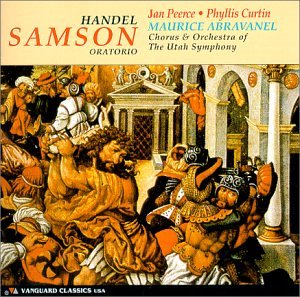 I was also just fascinated with how people were looking at text and meaning. What kind of texts are people setting, and how does the composer respond to the text? That’s a very interesting subject and sometimes quite baffling when you find out that somehow the composer is using the text but he’s not paying a lot of attention to it. You wonder why he isn’t writing a sonata of some sort. And in operatic things, it’s just lovely to turn yourself over to that person, that role, that character. The idiom for that character is in the music. That is utterly compelling, and that’s one of the things that’s so good about then going back to standard repertory. Let’s say with Mozart, some Mozart roles are made so pretty and they’re not really living up to what Mozart said in rhythm and everything else about who the character is. It’s become rather smoothed over. So it gives you a good look at music of any period.
I was also just fascinated with how people were looking at text and meaning. What kind of texts are people setting, and how does the composer respond to the text? That’s a very interesting subject and sometimes quite baffling when you find out that somehow the composer is using the text but he’s not paying a lot of attention to it. You wonder why he isn’t writing a sonata of some sort. And in operatic things, it’s just lovely to turn yourself over to that person, that role, that character. The idiom for that character is in the music. That is utterly compelling, and that’s one of the things that’s so good about then going back to standard repertory. Let’s say with Mozart, some Mozart roles are made so pretty and they’re not really living up to what Mozart said in rhythm and everything else about who the character is. It’s become rather smoothed over. So it gives you a good look at music of any period.
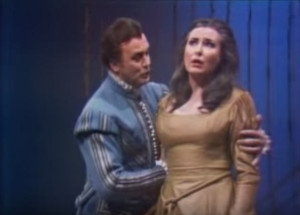
Phillis Curtin mit Nicolai Gedda in „Faust“/ youtube/ VAI
I always thought that it was immoral to make a living off the music of dead composers. If you care about music, you’ve got to get it off the paper for composers of your own time. Not everything is good. On the other hand, things that I may decide aren’t good now, forty years from now may be very popular. That’s always a possibility. Then, every composer in this world, no matter his acclaim, has written his own duds in life. So sure I’ve sung some that were never going to be heard again probably, but on the other hand, it sure was fun finding out.
Definitely. Who were some of the composers that you were closest to during your career? Well, I didn’t know a great many of the ones that you would know now. I don’t know what’s happened to some of them. A man who I thought was a singularly marvelous songwriter named Paul Des Marais. He wrote marvelous songs, but I’ve been out of touch with him for years. On the other hand, Ned Rorem and I have known each other for 50 years. He’s been a major part of my life. The same was true of Aaron Copland. And with both of them I sang their works with them at the piano and that was just wonderful, absolutely thrilling. I’ve sung Elliott Carter. There’ve been a whole lot. I could go on and on. Richard Hundley and Lee Hoiby and tons of them–it’s not just American works but contemporary works in English. That’s my language after all, and I was lucky enough to sing in the American premiere of Britten‘s Peter Grimes, also the American premiere of War Requiem and in many of the songs and cycles of his. And Samuel Barber, I mean we couldn’t have done without. Now, I have basically been through with performing not quite 20 years, so there’re many people I would have sung if I could have. And I still have music from a lot of people. John Harbison has stuff that I would have adored to sing, but I’m not singing anymore. That happens to singers, but I had 40 wonderful years of performance and in that period the people that I knew that were writing songs, well, there were very few of them whose work I didn’t do.
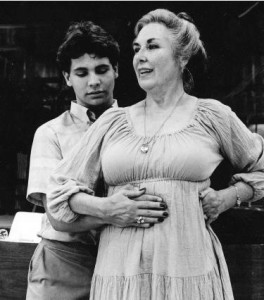
Unterricht: Curtin at Berkeshire/ photo larry murray/ berkshireonstage.com
Do you have a “most memorable” role or performance? Oh, honey, it was forty years. It’s impossible to say. I would say that the singularly most important non-operatic piece in my life is Britten’s War Requiem. That’s not American but the way it has always made me think about war and peace and religion is singular in my life. As to contemporary operas there are lots of things I can think of from horrifying experiences – my debut in New York was in a contemporary opera, not American, The Trial by Gottfried von Einem. And when we finished our first performance about a third of the audience had left and of the rest, half were hissing and booing and the rest of those were very enthusiastic. It was a singular night in my whole life. I never had another one like that.
Of course, the whole business of the Floyd operas has been really wonderful. Nobody knew a thing about Carlisle Floyd and he came to Aspen one summer when I was there and brought the opera [Susannah] with him. I had been singing so much new music that summer largely of Darius Milhaud, because he had insomnia all summer and he’d write at night and I’d sing it in the daytime. And I was so tired of looking at new scores of all kinds and from everywhere, so I said to Mr. Floyd, ‘Well if you’ll come and play it, we can look through it together,’ and I was carried away. First of all, in my part of the world – I grew up in West Virginia – and I understood this business of revival meetings and all of that. Mack Harrell was in Aspen at that time, and Mack grew up in Texas and he knew all of this, so we ran over to Mack’s house and went through it all with him. Now Mr. Floyd was teaching at Florida State University and he told them that we liked the opera and his dean said, ‘Well if you can get those two people to sing it, we will mount this opera for you.’ Well it happened that Mack and I had exactly the same two weeks free in February so the premiere of that opera was in Tallahassee, and while I was there I was invited to a party at Boosey and Hawkes for Benjamin Britten and I called up to say no I couldn’t come because I was down there doing an opera that they ought to know about, and the result of all of that was that Mr. Floyd went to Boosey and Hawkes. So there are lots of wonderful things like that.
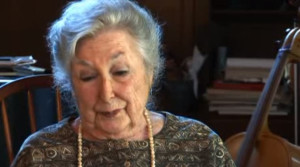
Phyllis Curtin im TV-Interview über ihre Zusammenarbeit mit Carlisle Floyd/ youtube 2002
Those are all singular experiences in new works, but there were countless others. No doubt, if I say anything at the [AMC] meeting [on May 6, 2002], I will also say how far and how much, though it does seem slow sometimes, American music for singers has caught on. When I was doing all that there weren’t very many. There were a couple of really good exponents like Bethany Beardsley and Phyllis Bryn-Julson, who were singing new music, and I, about 15 years into my career, sent a program to my management that I would sing at a place that had engaged me and I decided that it would all be in the English language. It would largely be American music, some Britten, but all in English. Well, my agent was horrified and said nobody will buy this concert and I said, ‘Well I’d like you to send it along anyway.’ Well, in just a few days he called back sounding triumphant. He said we’d got a telegram that said, ‘Tell that person that we do not want a radical program like that, we want a regular concert.’ And I thought, ‘Well isn’t that crazy, in America we want to have regular concert program in three languages none of them understand.’ But things have changed a lot. I mean when I look at what we do at Tanglewood with song literature. We do contemporary American music all summer long along with other things and more and more singers are doing that. And I think that’s such an exciting thing that lots of singers care about American music now. So those are the singular things.
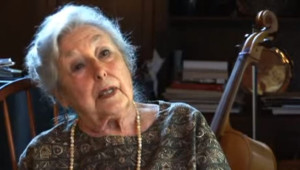
Phyllis Curtin im TV-Interview über ihre Zusammenarbeit mit Carlisle Floyd/ youtube 2002
I want to talk a little bit more about your generic viagra online teaching before we finish up here… Oh, well, teaching. I was a violinist and making music was nice for me but I discovered, as I was in my junior year at college that I just couldn’t afford to do all the things I was doing and be in the orchestra and blah, blah, blah. So I thought I’d take singing lessons once a week instead. And encountered a remarkable lady, the most interesting one I ever knew, a Russian woman. The dean at Wellesley had told me that I could not take singing lessons because I was carrying too many academic subjects. So I went to see the teacher and I didn’t have anything to sing for her, so she said, “Well, do you read?’ Well, there was my big thing, so we read through some French songs and she somehow arranged for me to take lessons. I found that singing put together all of the things that I cared about. Of course, music, poetry, drama, the whole lot there waiting with singers. Song literature, sacred music, operatic music, chamber music, it’s all there and so I studied with her through college and then I only had one other teacher after that and that was it, but the second teacher enable me to do what the first gave me a vision of.
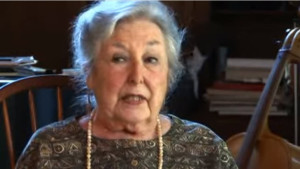
Phyllis Curtin im TV-Interview über ihre Zusammenarbeit mit Carlisle Floyd/ youtube 2002
I know what a difference it made in me being a singer so I’ve always been fascinated by making singing possible without obstructions physically. From time to time somebody would ask to study with me. I was not doing any full time teaching because I was touring all the time but during the War Requiem summer at Tanglewood when we did the American premiere there and I was there for rehearsals, they had some very unhappy singers. The program had changed and the man who was running the music center said, ‘Let’s think of something to do. We’ve got singers who are about to mutiny.’ And I said, ‘I suppose we can sit around and talk about singing.’ And this year will be the 38th summer we’re doing that. It has been wonderful. First of all, if you really love to teach, which I do, there is nothing so good for one’s work as to try and get someone else to take those tools and do something. It’s so wonderful to watch a young artist grow and develop and think that you helped them along the way, just giving him the tools to be his own artist, not mine or anybody else’s. Now hundreds of people audition for this class of 24, and I get the most wonderful artists.
After I retired from performance, I taught at the Yale School of Music and then from there I went to Boston University where I was dean at the College of Fine Arts and I also taught full time. I still go there two days a month and teach, and I have a lot of students who come out here to the country. It’s the joy of my life and I know more all the time. If I could have known all that when I was singing it would have been even better. The whole purpose is to make singers secure and reliable and give them something good to grow on so that they can grow through their years of vocal development and be happy. And I love it.
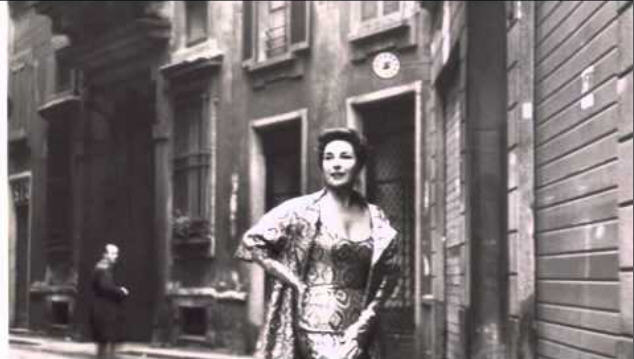
Phyllis Curtin/ PR-Foto / youtube
***
Und nochmals eine ausführlichere Vita: Phyllis Curtin (was) a leading educator and interpreter of contemporary vocal music. Her career highlights include singing leading roles in the world premiere performances of several Carlisle Floyd operas includingSusannah (1955); WutheringHeights (1958); Passion of Jonathan Wade(1962); the world premiere of Darius Milhaud’s La Mère Coupable (1966) and the American premiere of his Medea (1955). She was also the soprano soloist for the American premieres of Benjamin Britten’s War Requiem (1963) and Dmitri Shostakovich’s Symphony No. 14 (1971). A leading soprano for the Metropolitan Opera (1961-74) and the Vienna Staatsoper (1960-62), Ms. Curtin made her New York City Opera debut in the American premiere of Von Einem’s The Trial (1953), and made her recital debut at New York’s Town Hall in 1950. A committed educator, she has served as artist-in-residence at the Aspen Music Festival (1953-1957), artist-in-residence and teacher of the Phyllis Curtin Seminar and Vocal Fellows, Berkshire Music Center (1964-present), Professor of Music and Director of Opera, Yale Music Division (1974-83); Master, Branford College, Yale University (1979-83), and Dean, College of Fine Arts (1983-1991). Since 1991, she has served as professor of voice and artistic director of the Opera Institute, as well as dean emerita for the College of Fine Arts, at Boston University. Ms. Curtin holds a bachelor’s degree in music from Wellesley College, and five honorary doctorates including New England Conservatory. (Quelle NewMusicBox)
Wir bedanken uns für die Erlaubnis zur Übernahme dieses Artikels von NewMusixBox unter Chefredakteur Frank J. Oteri. Das Interview von Molly Sheridan mit Phyllis Curtin erschien ebendort am 25. April 2002 und ist „reprinted with the permission of NewMusicBox, the web magazine from New Music USA„. Wir danken sehr für diese Großzügigkeit unter Journalistenkollegen!

